|
 |
|
 |
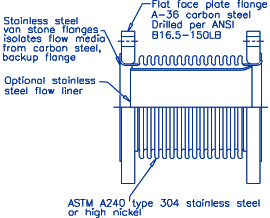 |
|
|
Design Features, P/N 2506 shown
|
Series 2500 Round Expansion Joints
 |
 |
Sizes 6" through 48" diameter |
 |
 |
Austenitic stainless steel and high nickel alloy bellows |
 |
 |
Wide selection of end fittings |
 |
 |
Designed for maximum flexibility and fatigue life |
 |
 |
Light weight construction |
Series 2500 Round Expansion Joints are specifically designed for light weight circular ducting used for engine exhaust systems, flue stacks, fan connectors, ventilation ducting and air handling systems. The bellows are designed to absorb axial, lateral and angular movements without exerting high spring forces on the system. Standard designs are ideally suited for engine exhaust manifolds, turbocharger exhaust connectors, and fan inlet and exhaust connectors. The standard designs can also be adapted to special configurations with special flanges, transitions and elbows. Refer to Series 2500 Laminated Bellows Expansion Joints for sizes 3" - 18" for similar expansion joints with high internal damping for applications with vibration or oscillation.
Design Conditions
 All Series 2500 Round Expansion Joints are designed for a maximum pressure (including test pressure) of 15 psig and a full vacuum. The design temperature varies with the material used for construction. All Series 2500 Round Expansion Joints are designed for a maximum pressure (including test pressure) of 15 psig and a full vacuum. The design temperature varies with the material used for construction.
| Model |
 |
Weld End/Flange Material |
|
 |
 |
|
 |
Carbon Steel |
 |
Stainless Steel* |
 |
 |
 |
 |
|
 |
|
2504
2505
2506
2507 |
 |
775º F
775º F
1100º F
775º F |
 |
1250º F
1250º F
1250º F
1250º F |
|
 *Higher temperatures available at *Higher temperatures available at
reduced pressure |
The materials of construction for standard assemblies are Type 304 stainless steel for the bellows, van stone ends and flow liners, and A-36 carbon steel plate flanges and angle flanges, A-53 standard weight carbon steel pipe or A36 fabricated ducting. Optional materials are available including the substitution of stainless steel for flanges and pipe.
Applications
The lower expansion joint in the illustration is a typical application of a Series 2500 expansion joint installed at an engine or fan discharge. The motion for this joint is primarily lateral. Column 4 of the Design Data indicates the rated values for each configuration. If the required motion exceeds the rated value, a Universal Expansion Joint should be considered as described below. For applications of this type it is good practice to add Tie Rods to the expansion joint - refer to the Tie Rod section below. The rated motions are for conditions resulting from thermal expansion. High frequency motions such as those caused by excessive engine roll or vibration may cause fatigue of the expansion joint. Consultant the factory for these applications.
The two upper expansion joints shown in the illustration are axial applications in pipe or duct runs. Two or more joints are required if the motion exceeds the rated value of a single joint. The Intermediate Anchor is necessary to ensure that each joint absorbs the required motion. It is good practice to design the Intermediate Anchor for loads equal to the spring force at full travel.
 |
 |
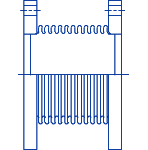 |
 |
 |
 |
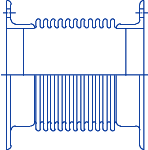 |
2504 Weld End
|
|
2505 Fixed Flange
|
|
2506 Van Stone Flange
|
|
2507 Angle Flange
|
Design Data
Type 2504, 2505, 2506 & 2507 Round Expansion Joints
Nominal
Size
(NPS)
|
Axial
Compr.
(inches)
|
Axial
Ext.
(inches)
|
Lateral
Offset
(inches)
|
Axial
Spring
Rate
(lb/in)
|
Part Number
2504
2505
2506
|
2504
|
2505/2506
|
2507
|
Overall
Length
(inches)
|
Weight
(lbs)
|
Overall
Length
(inches)
|
Weight
(lbs)
|
Overall
Length
(inches)
|
Weight
(lbs)
|
6
|
2.0
3.0
|
1.0
1.5
|
0.75
1.38
|
205
154
|
-060-2.0
-060-3.0
|
10.0
12.0
|
2
3
|
7.25
9.25
|
22
23
|
8.5
10.5
|
5
6
|
8
|
2.0
3.0
|
1.0
1.5
|
0.56
1.06
|
181
135
|
-067-2.0
-067-3.0
|
10.0
12.0
|
2
4
|
7.25
9.25
|
31
33
|
8.5
10.5
|
7
8
|
10
|
2.0
3.0
|
1.0
1.5
|
0.44
0.88
|
221
166
|
-074-2.0
-074-3.0
|
11.0
13.0
|
4
5
|
7.75
9.75
|
42
43
|
8.5
10.5
|
9
9
|
12
|
2.0
3.0
|
1.0
1.5
|
0.38
0.69
|
204
153
|
-080-2.0
-080-3.0
|
11.0
13.0
|
6
8
|
7.75
9.75
|
87
89
|
9.0
10.75
|
13
15
|
14
|
2.0
3.0
|
1.0
1.5
|
0.38
0.63
|
582
436
|
-081-2.0
-081-3.0
|
11.0
13.0
|
7
8
|
7.75
9.75
|
106
107
|
8.75
10.75
|
16
18
|
16
|
2.0
3.0
|
1.0
1.5
|
0.32
0.56
|
653
490
|
-082-2.0
-082-3.0
|
12.0
14.0
|
8
10
|
7.75
9.75
|
120
122
|
8.75
10.75
|
24
26
|
18
|
2.0
3.0
|
1.0
1.5
|
0.25
0.5
|
723
542
|
-083-2.0
-083-3.0
|
12.0
14.0
|
10
12
|
7.75
9.75
|
124
126
|
8.75
10.75
|
26
29
|
20
|
2.0
3.0
3.5
|
1.0
1.5
1.8
|
0.25
0.44
0.69
|
592
444
355
|
-084-2.0
-084-3.0
-084-3.5
|
13.0
15.0
17.0
|
12
15
18
|
7.75
9.75
11.75
|
146
149
152
|
8.75
10.75
12.75
|
30
32
36
|
22
|
2.0
3.0
3.5
|
1.0
1.5
1.8
|
0.19
0.38
0.63
|
645
484
387
|
-085-2.0
-085-3.0
-085-3.5
|
13.0
15.0
17.0
|
13
17
20
|
7.75
9.75
11.75
|
157
161
164
|
8.75
10.75
12.75
|
33
36
39
|
24
|
2.0
3.0
3.5
|
1.0
1.5
1.8
|
0.19
0.38
0.63
|
701
525
420
|
-086-2.0
-086-3.0
-086-3.5
|
13.0
15.0
17.0
|
14
18
22
|
8.25
10.25
12.25
|
243
247
251
|
8.75
10.75
12.75
|
36
40
43
|
26
|
2.0
3.0
3.5
|
1.0
1.5
1.8
|
0.19
0.31
0.56
|
756
567
454
|
-087-2.0
-087-3.0
-087-3.5
|
13.0
15.0
17.0
|
15
19
23
|
8.25
10.25
12.25
|
271
275
279
|
9.75
11.75
13.75
|
48
52
55
|
28
|
2.0
3.0
3.5
|
1.0
1.5
1.8
|
0.19
0.31
0.50
|
812
609
487
|
-088-2.0
-088-3.0
-088-3.5
|
13.0
15.0
17.0
|
16
20
25
|
8.25
10.25
12.25
|
298
302
305
|
9.75
11.75
13.75
|
52
55
59
|
30
|
2.0
3.0
3.5
|
1.0
1.5
1.8
|
0.13
0.25
0.50
|
778
647
485
|
-089-2.0
-089-3.0
-089-3.5
|
14.0
16.0
18.0
|
18
24
29
|
8.25
10.25
12.25
|
328
334
339
|
9.75
11.75
13.75
|
55
57
62
|
32
|
2.0
3.0
3.5
|
1.0
1.5
1.8
|
0.13
0.25
0.44
|
823
683
513
|
-090-2.0
-090-3.0
-090-3.5
|
14.0
16.0
18.0
|
20
25
31
|
8.25
10.25
12.25
|
393
398
404
|
9.75
11.75
13.75
|
58
62
67
|
34
|
2.0
3.0
3.5
|
1.0
1.5
1.8
|
0.13
0.25
0.44
|
871
720
541
|
-091-2.0
-091-3.0
-091-3.5
|
14.0
16.0
18.0
|
21
27
33
|
8.25
10.25
12.25
|
411
417
423
|
9.75
11.75
13.75
|
61
64
70
|
36
|
2.0
3.0
3.5
|
1.0
1.5
1.8
|
0.13
0.25
0.38
|
920
756
570
|
-092-2.0
-092-3.0
-092-3.5
|
14.0
16.0
18.0
|
22
28
35
|
8.25
10.25
12.25
|
446
452
459
|
9.75
11.75
13.75
|
65
68
74
|
38
|
2.0
3.0
3.5
|
1.0
1.5
1.8
|
0.13
0.25
0.38
|
968
792
600
|
-093-2.0
-093-3.0
-093-3.5
|
14.0
16.0
18.0
|
23
30
37
|
8.25
10.25
12.25
|
508
515
552
|
9.75
11.75
13.75
|
67
71
77
|
40
|
2.0
3.0
3.5
|
1.0
1.5
1.8
|
0.13
0.19
0.38
|
1017
828
630
|
-094-2.0
-094-3.0
-094-3.5
|
14.0
16.0
18.0
|
24
32
39
|
8.25
10.25
12.25
|
531
539
546
|
9.75
11.75
13.75
|
72
75
82
|
42
|
2.0
3.0
3.5
|
1.0
1.5
1.8
|
0.13
0.19
0.31
|
1065
867
660
|
-095-2.0
-095-3.0
-095-3.5
|
14.0
16.0
18.0
|
25
33
40
|
8.25
10.25
12.25
|
571
579
586
|
9.75
11.75
13.75
|
76
79
86
|
44
|
2.0
3.0
3.5
|
1.0
1.5
1.8
|
0.13
0.19
0.31
|
1113
906
689
|
-096-2.0
-096-3.0
-096-3.5
|
14.0
16.0
18.0
|
27
35
43
|
8.25
10.25
12.25
|
610
618
626
|
9.75
11.75
13.75
|
79
82
90
|
46
|
2.0
3.0
3.5
|
1.0
1.5
1.8
|
0.06
0.19
0.31
|
1161
945
719
|
-097-2.0
-097-3.0
-097-3.5
|
14.0
16.0
18.0
|
28
36
44
|
8.25
10.25
12.25
|
633
641
649
|
9.75
11.75
13.75
|
82
86
94
|
48
|
2.0
3.0
3.5
|
1.0
1.5
1.8
|
0.06
0.19
0.31
|
1209
984
749
|
-098-2.0
-098-3.0
-098-3.5
|
14.0
16.0
18.0
|
29
38
46
|
8.25
10.25
12.25
|
674
683
691
|
9.75
11.75
13.75
|
86
90
98
|
1
|
2
|
3
|
4
|
5
|
6
|
7
|
8
|
9
|
10
|
11
|
12
|
 Universal Expansion Joints
Universal Expansion Joints
Series 2500 Universal Expansion Joints are two bellow elements separated by a pipe spool. They are designed primarily for lateral movement. Unlike a single expansion joint that absorbs lateral motion by reshaping the bellows centerline, universal joints absorb lateral motion by angular displacement of the bellows elements. As a result, as the joint length increases, the lateral motion capability increases and the forces and moments acting on the adjacent equipment decrease. The application of a universal expansion joint is a very effective method of absorbing lateral motions with minimum loading on equipment.
 |
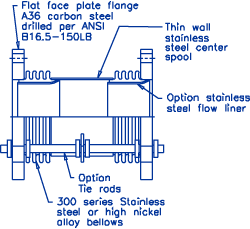 |
|
Universal Expansion Joint |
Since most low pressure piping and ducting is not as rigidly anchored and guided as high pressure systems, tie rods are recommended for universal expansion joints. Tie Rods react the pressure thrust, protect the bellows elements from over extension or compression, and control and react the weight of the center spool. The illustration shows the stops that limit the travel and the center spool support. Longer tied universal expansion joints typically have to supports on each rod to guide the center spool. In addition the expansion joint can be incorporated into pipe runs where the expansion joint extends the length of the run, and the expansion of the run is absorbed within the tie rods as well as absorbing the expansion of the adjacent run by lateral offset.
Hyspan does not catalog standard Series 2500 Universal Expansion Joints designs because they are normally designed to meet the available length. Consult the factory or the Hyspan Sales Representative in your area for assistance.
Tie Rods
Tie rods are available as an option on Series 2500 single and universal expansion joints. They react the pressure thrust in piping and ducting that is not anchored such as the lateral application for single expansion joints and the universal expansion joint. They may also function as limit rods. Limit rods do not react the pressure thrust in service but they are designed to react pressure thrust in the event of an anchor failure. Their main function is to limit the axial extension and compression of the bellows to the rated values. Hyspan normally refers to both tie rods and limit rods as Tie Rods but the factory settings are important - factory settings as Tie Rods do not permit extension but limits compression to the rated value of the bellows. Factory settings as Limit Rods will permit axial extension and compression in accordance with the rated travel specified in the Design Data.
Flow liners
or internal sleeves are optional features that are available for all configurations. Liners provide a means of isolating the bellows element from direct contact with the flow; therefore eliminating flow induced vibration, minimizing pressure loss and creating dead air space that provides insulation. Hyspan installed flow liners follow the recommendations outlined in the Standards of the Expansion Joint Manufacturers Association, Inc. (EJMA) summarized as follows.
Flow liners are recommended for:
 |
 |
Gas applications exceeding 4 ft./sec./inch of diameter up to 6" NPS |
 |
 |
Gas applications exceeding 25 ft./sec. over 6" NPS. |
 |
 |
Liquid applications exceeding 2 ft./sec./inch of diameter up to 6" NPS. |
 |
 |
Liquid applications exceeding 10 ft./sec. over 6" NPS. |
 |
 |
All applications when flow turbulence is generated within 10 diameters from the expansion joint. |
 |
|
|
These values must be increased when:
|
 |
 |
The flow liner length, L, exceeds 18". Multiply the tabulated values by the factor, . . |
 |
 |
The velocity, V, exceeds 100 ft./sec. Multiply the tabulated values by the factor, . . |
 |
 |
When the flow is extremely turbulent such as downstream from valves, tees and elbows. Multiply the calculated velocity by 4 to determine if the velocity exceeds 100 ft./sec. |
 |
 |
If the liner length exceeds 18" and the velocity exceeds 100 ft./sec., apply both factors. |
|
There are special circumstances involving the use of flow liners:
 |
 |
Standard liners are rigidly attached on the upstream end of the expansion joint and open on the downstream end. If reverse flow conditions exist, the liner thickness must be very heavy gauge or a telescoping design should be used. |
 |
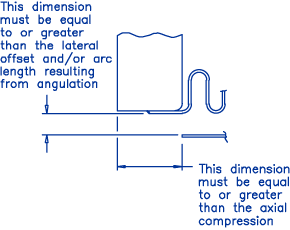
Flow Liner
|
 |
 |
If the expansion joint is installed is a vertical run and the flow is upward, drain holes should be added at the lowest point of the liner to avoid trapped liquid. |
|
 |
 |
Unless a special oversize bellows design is used, the flow liner will intrude into the pipe or duct flow path. If the expansion joint motion is axial only this intrusion will be minimal, and the liner inside diameter may be comparable to the adjacent pipe or duct. |
|
 |
 |
If there is lateral or angular motion the gap between the liner outside diameter and the bellows inside diameter must be great enough to allow for this movement as shown in the illustration.
|
|
 |
 |
Expansion joints designed for axial compression with flow liners must be designed so that the liner does not extent beyond the end of the joint shown in the illustration.< |
|
Ordering Instructions
Refer to the illustrations (2504, 2505, 2505 or 2507) above for the configuration required. Refer to the Design Data table for the available motions, spring rates, lengths and weights.
 Example: Example:
24" nominal diameter
Single fixed flange,
Standard bellows material, 304 stainless steel
Standard flange material A-36 carbon steel
3.0" axial compression, 1.5" axial extension
Installation Procedure
Operating Conditions: Series 2500 Low Pressure Round Expansion Joints are designed for applications where the pressure including tests does not exceed 15 psig. The design temperature varies with the configuration and materials of construction. Consult the purchase specification for the design temperature and the rated travel of the product purchased. Be certain that the system operating conditions and test conditions do not exceed the rated values.
Guides, Supports, Anchors: Series 2500 Low Pressure Round Expansion Joints are light weight construction. Guides, supports and anchors are important to prevent damage. Refer to the Applications section for the correct locations and design.
Flow Direction: The flow direction can be from either direction for Series 2500 expansion joints that do not include a flow liner. The flow direction for expansion joints with flow liners is from the fixed (welded) end to the free end as indicated on the exterior. Confirm that the joint is oriented correctly.
Shipping Restraints: External restraints are installed at the factory to ensure installation at the correct length and alignment. They are painted yellow and labeled - Shipping bars, remove after installation. Leave these restraints installed until after the installation of the expansion joint is complete - but they must be removed prior to pressure testing and use. CAUTION: Shipping restraints may be installed by welding. Provide protection for the bellows element from cutting or grinding during removal.
Tie Rods: Tie rods, limit rods, and control rods are devices that limit the travel of the expansion joint. They are available as an option on Series 2500 expansion joints. If they are included be certain that the installation allows the design movement of the expansion joint.
Post Installation Inspection
 |
1. |
Inspect the expansion joint for damage with close attention to the bellows element. |
 |
2. |
Is the expansion joint installed at the correct location; are the anchors, guides and supports installed in accordance with the system design? |
 |
3. |
Are the guides and supports free to allow the movement of the expansion joint? |
 |
4. |
Is the flow direction correct if a flow liner is installed? |
|
5. |
Have the shipping restraints been removed? |
Warranty
The Hyspan Limited Warranty applies to all Series 2500 expansion joints.
|
|

